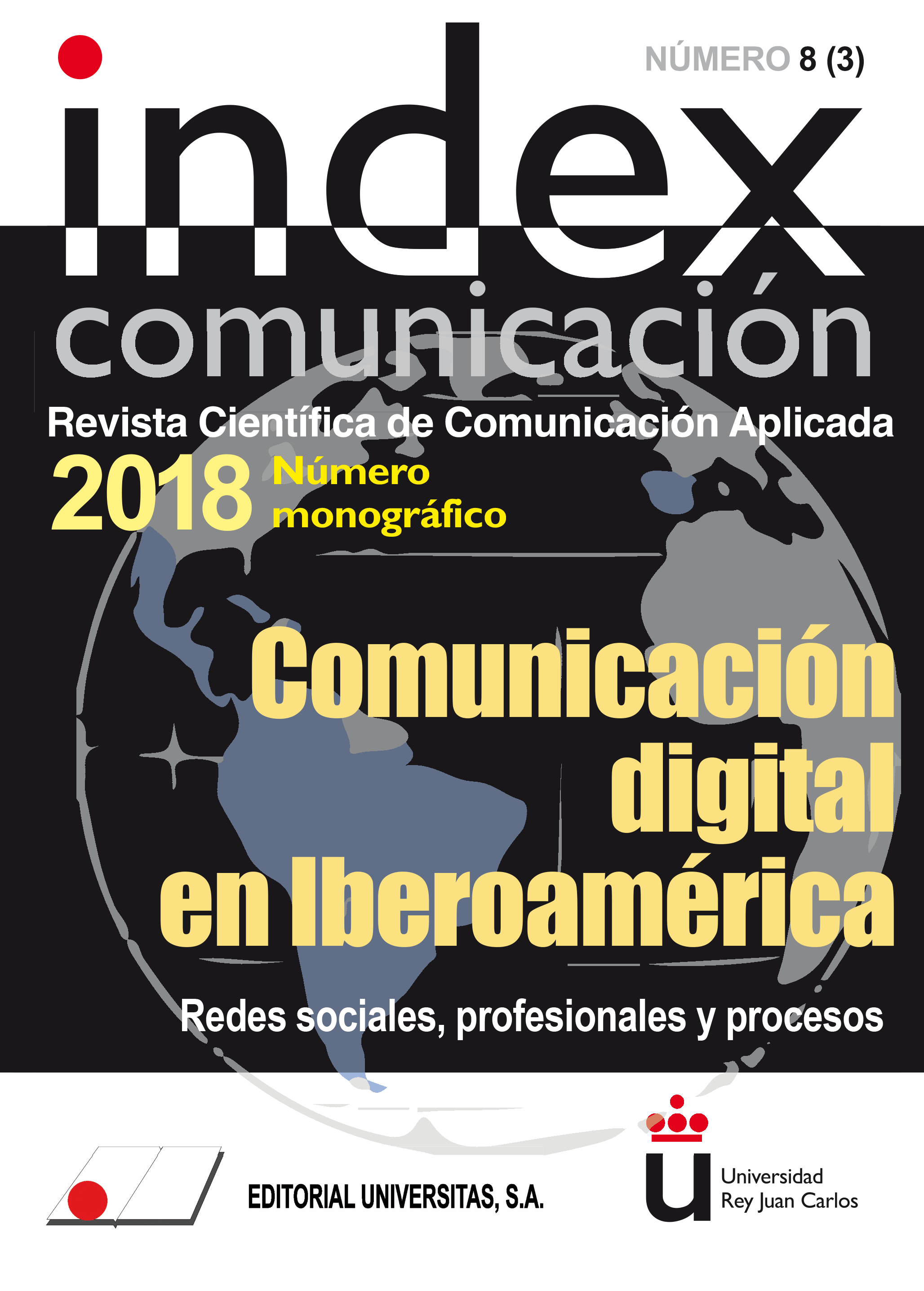New independent media in the digital media. The online radio station in Spain: Case study of ‘Carne Cruda’ and ‘Radiocable’
Keywords:
online radio, crowdfunding, independent media, digital media, participation, Spain,Abstract
The possibilities offered by Internet to both users and media have enabled radio to be the ideal space to work with economic and political freedom, facing the media monopoly. The use of smartphones, the emergence of digital sound platforms and streaming provide a wide range of sound contents (Pedrero, 2015). Free radios “give coherence to movements that claim them as a vector of change and social participation” (Chaparro, 2008). The type of radio stations we analyze in this research arise without being considered community radios, although they have a close relationship with this type of stations, whose essence is serving the interests of citizens. To achieve economic and political independence, online stations have used the formula of crowdfunding provided by their own listeners. In the current investigation we analyze the case of two online radios supported through crowdfunding which establish a relationship with the public based on public service: Carne Cruda and Radiocable. To carry out the study, a qualitative and quantitative methodology has been applied to offer an integral analysis of the phenomenon studied.
Metrics
References
AIMC (2017). Estudio General de Medios 2017. Madrid: Asociación para la Investigación de Medios de Comunicación.
AMARC, A. (2010). Principios para Garantizar la Diversidad y el Pluralismo en la Radiodifusión y los Servicios de Comunicación Audiovisual. Boletín.
Arboledas, L. (2009). 'Clientelismo y concentración en la radio española. Comparación entre cuatro comunidades autónomas'. Revista Latina de Comunicación Social, 64 909-925.
Castells, M. ; Fernández, M. ; Linchaun, J. y Sey, A. (2006). Comunicación móvil y sociedad, una perspectiva global. Barcelona: Ariel-Fundación Telefónica.
Cebrián, M. (2009). 'Expansión de la ciberradio'. Enl@ce Revista Venezolana de Información, Tecnología y Conocimiento 6 (1), 11-23.
Chaparro, M. (1998). Radio pública local. Sevilla: Fragua
Chaparro, M. (2008). 'Los escenarios europeo y latinoamericano. Medios comunitarios y ciudadanos'. Telos: Cuadernos de comunicación e innovación, (74), 143-148.
Cheval, J. J. (2013). El grupo GRER hace una llamada para apoyar a la investigación. En Radiography.hypotheses.org. Disponible en: http://radiography.Hypotheses.org/ 181 [Consulta: 20 Abril 2018]
Cuesta, C., Fernández de Lis, S., Roibas, I., Rubio, A., Ruesta, M., Tuesta, D., & Urbiola, P. (2014). Crowdfunding en 360º: alternativa de financiación en la era digital. BBVA Research.[Sitio web]. Bilbao.[Consulta: 20 Enero 2016]. Disponible en: https://www. bbvaresearch.com/publicaciones/crowdfunding-en-360o-alternativa-definanciacion-en-la-era-digital.
Engler, V. (2017). 'Antifeminismo" online"'. Nueva sociedad, (269), 78-88.
Fernández. M. (2016). Fernando Berlín: "No existen grandes medios de comunicación de izquierdas" https://www.diariocritico.com/entrevistas/fernando-berlin
García-García, J. (2013). Transformaciones en el Tercer Sector: el caso de las radio comunitarias en España. adComunica, (5), 111-131.
García Gil, S., Gómez García, S.., & Reguero Sanz, I. (2018). 'Espacios alternativos de libertad durante la Transición. Breve historia de las radios libres en España (1976-1983)'. Revista Latina de Comunicación Social, (73), 1179-1210.
García González A., & Román Portas, M. (2018). 'Sobre los nuevos modelos de negocio en las actividades radiofónicas'. Revista de la Asociación Española de Investigación de la Comunicación, 4(7), 40-45.
Golán, M. L. (2018). 'Audiencias participativas: el poder de la multitud en tiempos de crowdfunding'. Revista Latina de Sociología, 8(1), 1-12.
López Vidales, N, Rubio, L. G y García, M. R. (2015). 'La radio de las nuevas generaciones de jóvenes españoles: Hacia un consumo online de música y entretenimiento'. ZER-Revista de Estudios de Comunicación, 19 (37), 45- 64.
López Villafranca, P. y Olmedo Salar, S. (2017). 'La radio social independiente frente a los grupos de poder en España'. En Marta Lazo, C.(coord.). Perfiles actuales en la información y en los informadores. Madrid: Editorial Tecnos (Anaya), 135-149.
Martínez-Costa, M.P (2011). 'La nueva organización de la producción'. En Ortiz-Sobrino, M.A.; López, N. (Ed). Radio 3.0: Una nueva radio para una nueva era (pp. 123-141). Madrid: Fragua.
Martínez-Costa, M. P.; Moreno, E., & Amoedo, A. (2018). 'Mapa de la radio online en España: tipología y caracterización en el contexto de los cibermedios'. El profesional de la información (EPI), 27(4), 849-857.
Pedrero Esteban, L. M. (2015b). La era dorada del audio digital. Publicado el 10-11- 2015. [Online]. (goo.gl/ei5Vhy) (2016-08-29).
Ramos Martín, J.; Morais, S., & Barranquero, A. (2018). 'Las redes de comunicación alternativa y ciudadana en España.: Potencialidades, dificultades y retos'. OBETS: Revista de Ciencias Sociales, 13(1), 121-148.
Rodríguez Ortega, S. (2016). Estrategias de fidelización en al radio online: Construir una ‘comunidad’ en Internet. El caso ‘La Cafetera’ de Radiocable.com. Trabajo Fin de Grado. Universidad Autónoma de Barcelona.
Sánchez Riofrío, A. M. & Palma Reyes, C. P. (2018) . 'Crowdfunding: Una revisión de la literatura crowdfunding: a review of literature'. Revista Científica ECOCIENCIA, 1-18.
Sénecal, M. (1986). Televisiones y radios comunitarias. Teoría y práctica de una experiencia social. Barcelona: Mitral.
Sixto García, J. (2018). 'La radio española en las redes sociales: cross-media en el escenario convergente'. Communication Papers, 7(14), 181.
Published
How to Cite
Issue
Section
License
Authors who submit to this journal agree to the following terms:
Authors retain copyright and ensure the magazine's right to be the first publication of the work as licensed under a Creative Commons Attribution-NoComercial 4.0 International License that allows others to share the work with an acknowledgment of authorship of the work and the initial publication in this magazine, with no commercial purpose.
Authors can establish separate additional agreements for non-exclusive distribution of the version of the work published in the magazine (for example, to an institutional repository or publish it in a book), with an acknowledgment of its initial publication in this journal.
It allows and authors are encouraged to disseminate their work electronically (eg, in institutional repositories or on their own website) prior to and during the submission process, as it can lead to productive exchanges, as well as a citation more early and most of the published work (See The Effect of Open Access).















